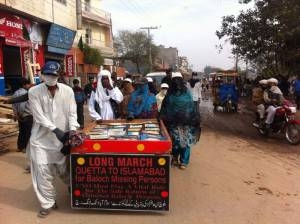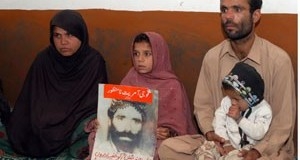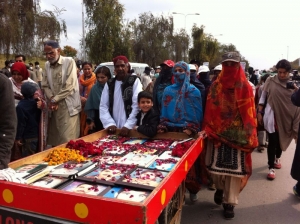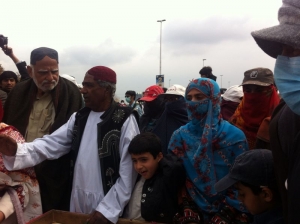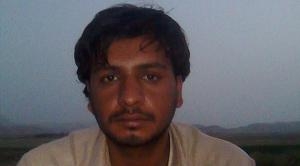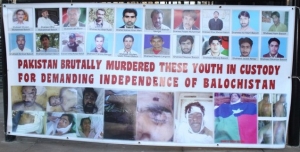Leading the march were Chairman VBMP, Nasrullah Baloch (missing an uncle for 11 years) and Mama Qadeer Baloch (missing a cousin since 2001 and whose son was killed during detention by the military). They were supported by men, women and children wanting to recover their loved ones that they allege are victims of a “kill and dump” policy in Balochistan aimed at political workers by intelligence agencies.
Thousands of people have gone missing after arrests which began in 2001, exact numbers are not known. Marchers feel betrayed by the judiciary, particularly the Supreme Court of Pakistan which they claim is hearing cases of enforced disappearances but doing little to stop them. Families talk of secret detention centres and military torture cells. Some of the missing have failed to be produced in court as ordered by the judiciary and the military are declining to attend hearings.
Chief Minister of Balochistan, Dr. Abdul Malik admitted that his government had failed to solve the issue of missing persons. As well as marching, participants initiated a hunger strike in Karachi and displayed banners protesting extra judicial killings.
The second phase of the Long March is from Karachi to Islamabad, a distance of over 1,400 kms. The Asian Human Rights Commission has praised the courage of the Long Marchers and called on the government of Prime Minister Nawaz Sharif to address the issue of enforced disappearances which campaigners claim is “state terrorism” and introduce a law making such disappearances a criminal offense. It is feared however that new legislation, Protection of Pakistan Ordinance (PPO) will increase human rights abuses regarding detention of citizens and turn Pakistan into a “security state”.
In a press release 5th February 2014, Amnesty International called on Pakistani authorities to act.
“to ensure an independent and impartial investigation into the unmarked graves found in Totak, near Khuzdar in Balochistan province on 25 January and the alleged abduction and extra judicial execution of a child by state security forces two weeks earlier. Urgent action must also be taken to protect “Long March” activists who have received death threats for highlighting the human rights situation in Balochistan and investigate the source of these threats”
http://www.amnesty.org/en/library/asset/ASA33/001/2014/en/ac1bc02f-0200-4512-88f7-340c4a60161c/asa330012014en.pdf
One of the most disturbing allegations highlighted by Amnesty is of the extra-judicial execution of 10 year old Chakar Baloch in Turbat, Balochistan,
“according to a medical examination carried out at District Headquarters Hospital in Turbat, Chakar Baloch’s body bore what appeared to be torture marks and four bullet wounds to the head, chest and left arm due to gunshots at close range.”
Marchers accused the media of ignoring their plight, displaying banners saying “media silence is shameful”.
Tweets just in alleged new threats to the people of Balochistan alleging… Pakistan’s army were using gunship helicopters to carry out a “horrendous operation in Dera Bugti and Pirkoh areas of Balochistan, 6 including woman and 2 children killed and several injured.” The most recent tweet updated the situation on the “heavy bombardment” claiming “death toll of Pirkoh operation rises to 22. Most of the victims of Pakistan Army barbarism are women and children.”
Carol Anne Grayson is an independent writer/researcher on global health/human rights and is Executive Producer of the Oscar nominated, Incident in New Baghdad. She is a Registered Mental Nurse with a Masters in Gender Culture and Development. Carol was awarded the ESRC, Michael Young Prize for Research 2009, and the COTT ‘Action = Life’ Human Rights Award’ for “upholding truth and justice”. She is also a survivor of US “collateral damage”.

